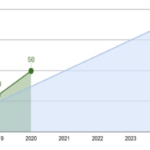BBVA reaches 50 percent of its sustainable financing target one year ahead of schedule until 2025
BBVA reached €50.2 billion in sustainable financing at the end of December 2020. This means it has achieved half of its sustainable financing objective foreseen for the 2018-2025 period (€100 billion), one year ahead of schedule. The growth rate in the financing of this type of BBVA sustainable operation is 33 percent more than planned.

BBVA accelerates in its 2025 Pledge to mobilize €100 billion in sustainable financing in the fight against climate change. In 2020 alone, and despite the pandemic, it reached €20 billion, 12 percent more than in 2019. The bank's pledge against climate change contributes to the achievement of the United Nations´ Sustainable Development Goals (SDGs) and the challenges of the Paris Climate Agreement.
The €50.2 billion mobilized include operations in green financing (60 percent of the total); financial inclusion and entrepreneurship (13 percent); social infrastructure and agribusiness (12 percent); and other sustainable mobilization (15 percent).
For BBVA's Head of Global Sustainability Office , Ricardo Laiseca, "This data confirms a great leap toward achieving our sustainable financing goal, with additional thanks to the reinforcement of the product offer in the retail and wholesale segments.", "this data confirms a great leap toward achieving our sustainable financing goal, with additional thanks to the reinforcement of the product offer in the retail and wholesale segments."
"We are helping companies find out the impact of their activities though the free service of calculating the carbon footprint"
In this regard, Ricardo Laiseca offered three examples. “First, promoting energy efficiency in households through the commitment to construction with environmental criteria, granting over €400 million in sustainable loans to developers, and granting sustainable mortgages and loans for the installation of solar panels, thermal enclosures and changing household appliances for a total of €126 million in 2020.”
“Second, we are helping companies find out the impact of their activities though the free service of calculating the carbon footprint in order to be able to subsequently transition to a more efficient production model,” he added.
“Finally, we are fostering sustainable mobility by developing an extensive catalog to finance electric cars, bicycles and scooters for an amount of €23 million in 2020,” he concluded.

Figures that beat the objectives of our 2025 Pledge: despite the pandemic, BBVA reached €20 billion in sustainable financing in 2020, 12 percent more than in 2019.
BBVA has become one of the most active banks in the issuance and intermediation of sustainable bonds worldwide. According to Bloomberg, BBVA is the most active bank in Spain in sustainable bonds, 4th in Europe and 8th in the world in 2020.
In May 2020, BBVA was the first private financial institution in Europe to issue a COVID-19-related social bond and, two months later, the bank was the first financial institution to issue contingent convertible perpetual bonds (CoCos) classified as green bonds, for €1 billion. The funds will be used to finance eligible green assets in BBVA’s portfolio, diversified into assets from different green sectors (energy efficiency, renewable energy, sustainable transportation, waste management and water management).
BBVA's Pledge 2025 is based on three lines of action: financing to help curb climate change and achieving the SDGs by mobilizing €100 billion between 2018 and 2025; integrating the environmental and social risks associated with the bank's activity to minimize the potentially direct and indirect negative impacts; and involving all stakeholders to collectively promote the contribution of the financial sector to sustainable development.
BBVA is incorporating the risks and opportunities involved with climate change into its investment and financing decisions. In addition, a fundamental part of the institution's strategy is to help its clients adapt to this new environment, not only in financing, but also advising them in this ecological transition.
